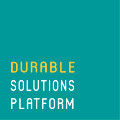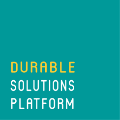The Durable Solutions Platform (DSP) together with the Program on Forced Migration and Health (PFMH) at Columbia University launched their joint report at the Columbia Global Centers | Amman (CGC), on Thursday 6 February. The research explored how Syrian refugees’ self-reliance could be improved while at the same time supporting host communities’ resilience and social cohesion. The event brought together around 100 people from various backgrounds, including national and international stakeholders from the UN, NGOs and civil society, as well as scholars and experts.
Dr. Ahmad Mousa from the CGC welcomed everyone to the event and the center by explaining that the research report was an outcome of multi-stakeholder engagement throughout most of 2019. Lana Stade from DSP welcomed participants by explaining that globally, durable solutions continue to be often out of reach for the growing number of displaced people, with displacement remaining a humanitarian, human rights and development concern. As a regional initiative, the DSP aims to generate knowledge, convene strategic dialogue and support programming solutions on the long-term future of people displaced from Syria.

As Syrians’ displacement is entering its ninth year in Jordan, the research project focused on assessing the lessons learned from the refugee response so far, and identify clear ways forward to support Syrian refugees’ and host communities’ self-reliance and resilience in the medium term, namely on education, social assistance and livelihoods.
Prof. Monette Zard from the PFMH at Columbia University shared overarching reflections from the research. Firstly, while Jordan has been an incubator for interesting policy approaches, such as the Jordan Compact, the complicated policy landscape can make it hard to predict and plan. Host communities and refugees reported dealing with similar challenges, such as high levels of poverty, debt and unemployment. However, Syrian refugees also face distinct challenges, due to documentation issues but also due to their displacement background. The political context is also important, with much empathy and goodwill still existing for refugees at the community-level.
The research team presented the main research findings and recommendations. Yusur Al-Salman shared the key education findings, relating to perceived education quality, school violence especially for young boys, and the weak linkages between higher education and employment. Dr. San Lau presented the livelihoods findings, which covered the limiting regulatory environment of the labor market, issues of decent work such as low wages and lack of access to justice for both Syrians and vulnerable Jordanians, as well as linking vocational trainings to market needs.

Dr. Goleen Samari concluded with the study’s key findings on social assistance, namely that income is often insufficient to meet basic needs, leading many Syrians refugees and vulnerable Jordanians to engage in negative coping mechanisms, such as taking on debt or taking children out of school to work as a last resort. Social assistance systems – despite being parallel systems – are experienced in very similar ways by Jordanians and Syrians, namely as confusing and unfair, potentially leading to perceptions of inequity and subsequently, some tensions
The presentation of findings was followed by a moderated panel discussion with experts, which explored the ways in which the humanitarian-development nexus could be successfully navigated in Jordan. Bryn Boyce, Deputy Director of Programs at the International Rescue Committee in Jordan (IRC), highlighted the need for ensuring that the aid architecture is designed in a way that allows international NGOs to work with national systems and government in an effective way. Dr. Ayat Nashwan, Associate Professor at Yarmouk University, stressed that more investment in psycho-social programs and services that match the needs and expectations of vulnerable people are needed.

Souzan Mohareb, Head of the Aid Department at the Arab Renaissance for Democracy and Development (ARDD), focused on innovative economic solutions that would lead to improved human rights. She underlined the need to generate a genuine political will for economic interventions that can lift people out of poverty and illegal negative coping mechanisms. Last but not least, Dr. Omar Rifai, Senior Adviser to HRH Prince Hassan and Director General of the West Asia North Africa Forum (WANA), emphasized that while a number of practical steps can be taken now through direct interventions, Jordan should be planning ahead with the refugee caseload in the picture. If young refugees are trained, they can become an asset for Jordan. As refugees have benefitted the societies they are resettled to, the key will be to translate the initial burden of hosting refugees into a stronger future for the countries they are currently residing in.
Following the moderated panel discussion, the floor was opened for questions and comments from the audience. Among other questions asked, the key theme of the economy came up repeatedly. Dr. Omar Rifai stressed that the economy is currently the biggest issue in Jordan, due to the consequences of Jordan being located in the middle of a turbulent region. While the Jordan Compact has not delivered on its promise yet, it presented a step in the right direction.

Souzan Mohareb added that the assessment of the Jordan Compact led stakeholders to examine Syrians’ displacement through a more holistic approach, which is positive in itself.
Dr. Ayat Nashwan drew on findings from her own qualitative research, which showed that the economic opportunities provided by the Jordan Compact did not align well with Syrians displaced from Dera’a, who are more skilled in agricultural labor. Bryn Boyce stressed the absence of the genuine perspective of the private sector in the Jordan Compact’s design and development. A key lesson to be learned for future compacts is that not all refugees were interested or experienced in manufacturing, and the Jordan Compact missed the entrepreneurial opportunities, leaving few incentives for refugees to grow businesses.
Prof. Monette Zard concluded the discussion stressing that the nexus transition should not happen in a way that would “shock the system”. Rather, donors and all stakeholders should start planning now in a way that is as transparent as possible. A unique opportunity presents itself today, with goodwill on the part of the government, of local communities and existing capacities and infrastructures to navigate the nexus in a smart way that helps everyone.


